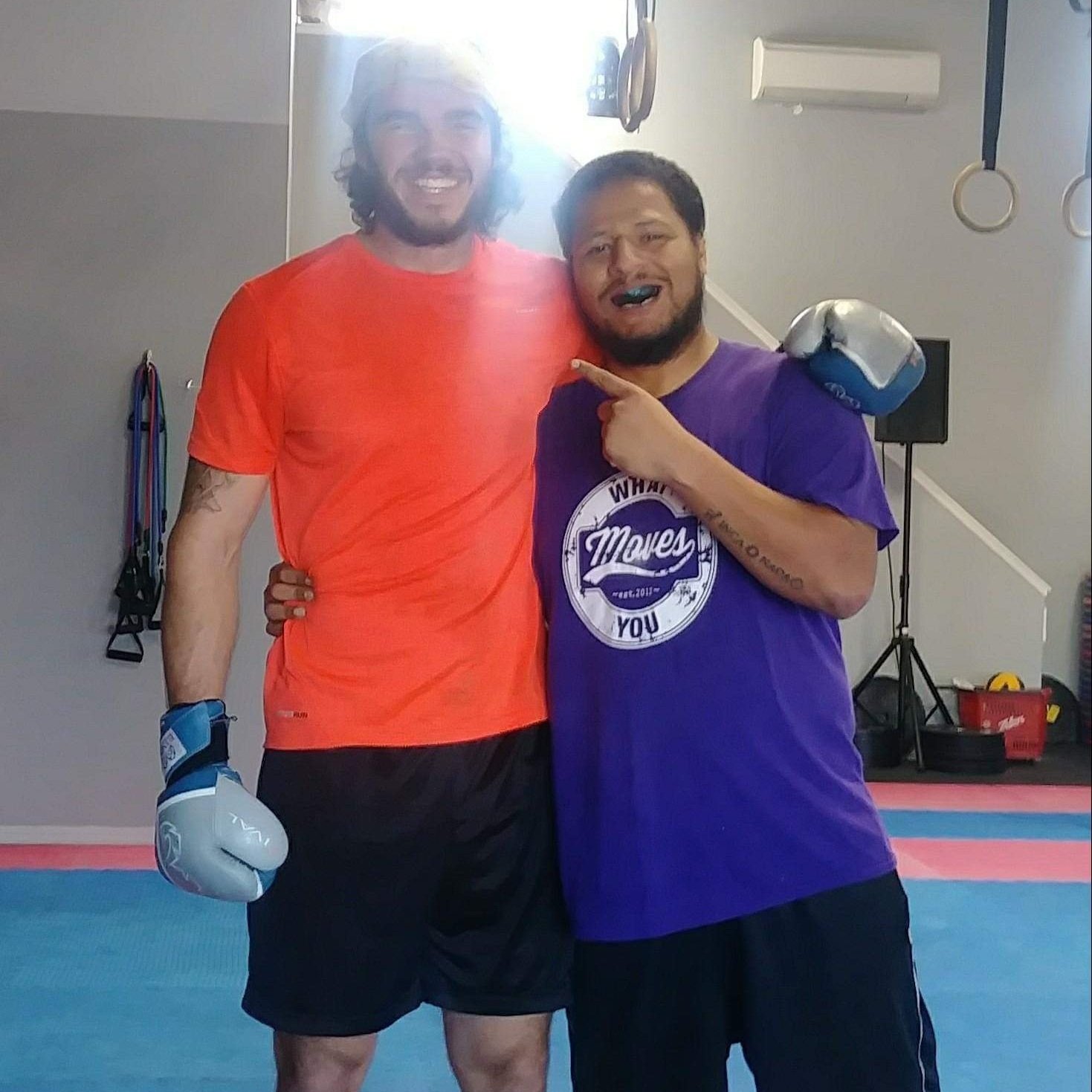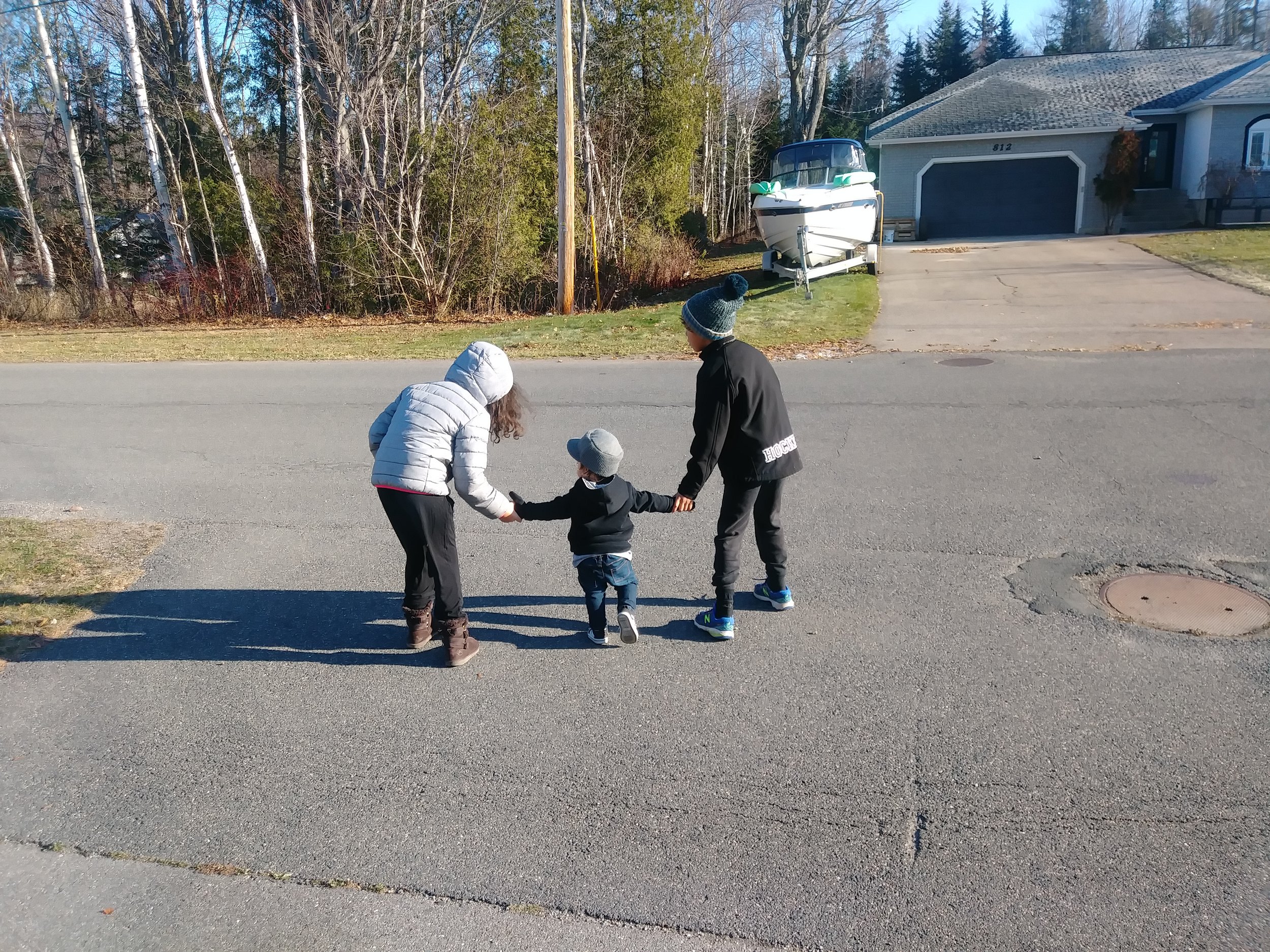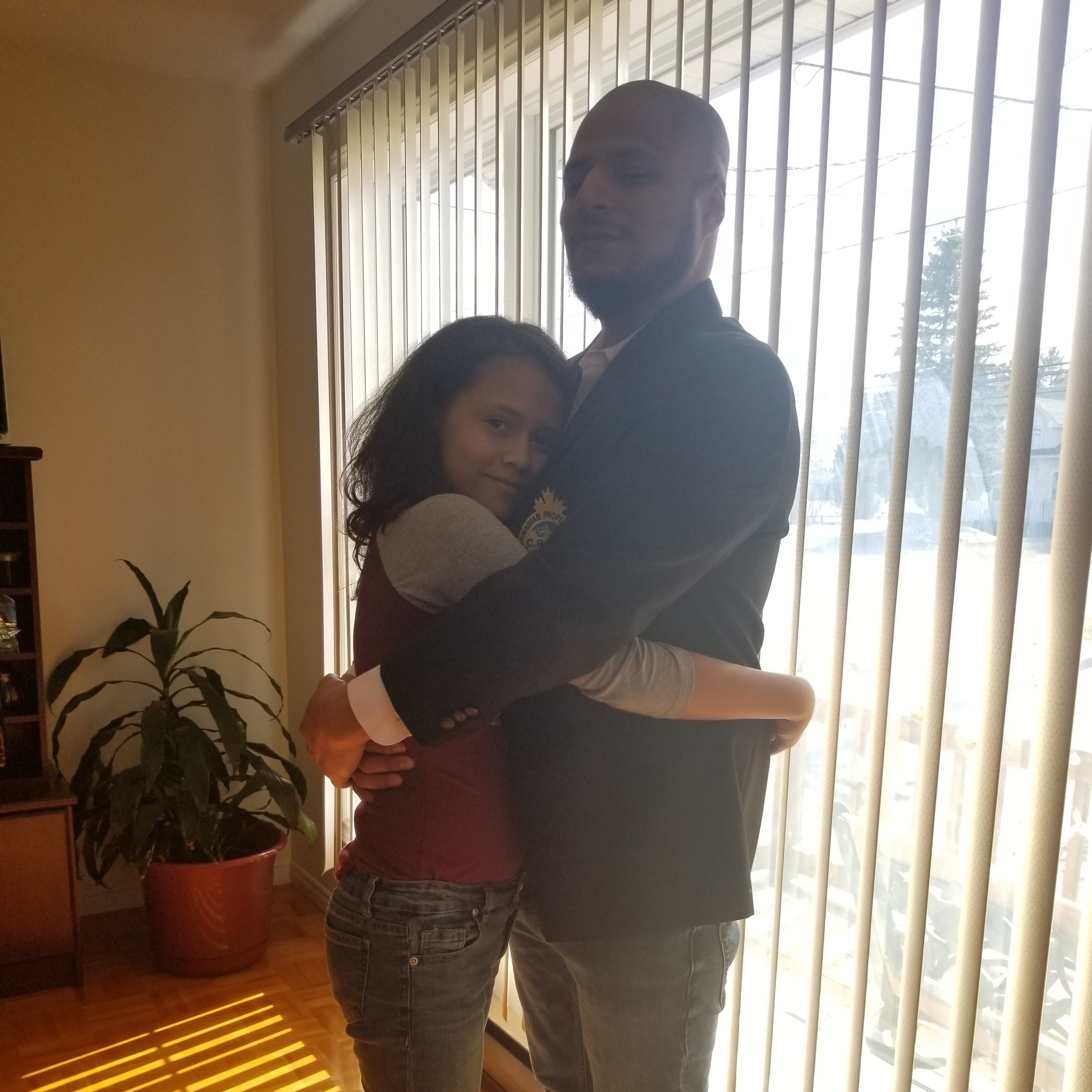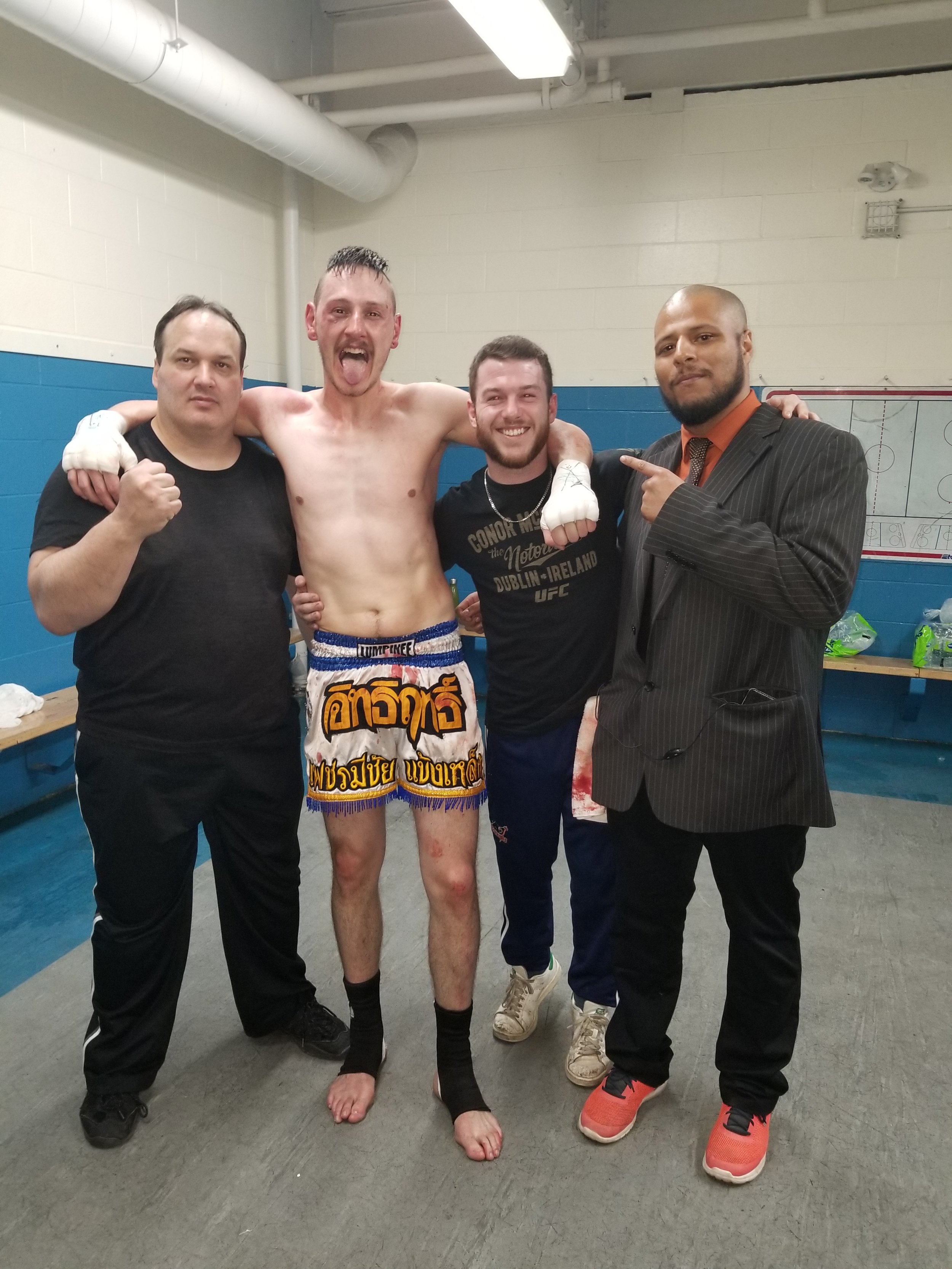Dodging Punches and Raising a Family
Jean-Martin Gauthier has immersed himself and his career in the world of boxing and combat sports. We talked to him to ask what the current outlook of concussions and boxing are like in Canada, as well as his own experience with concussions and how his recovery has affected his young children.
Can you give us a brief background of your involvement with sports?
I went through the regular process, played minor league hockey from age four until 17 and was on and off training in boxing gyms during the offseason. Hockey was my first love and quickly branched with Boxing. In both sports I went from fan to athlete to coach. I was President of the Senior Hockey Team we have here in New Brunswick for a little while, and am now working in an executive position with the CPBC (Canadian Professional Boxing Council) & the CWBA (Canadian Wheelchair Boxing Association). I am also occasionally working with the NBCS (New Brunswick Combat Sports Commission) as a dressing room inspector. I really love the time I get to spend with the fighters before fights. Dressing rooms before fights are a very special place and I am very grateful to have the chance to help out, meet great human beings and work in an industry that I genuinely love and respect. I get to work in different roles within different organizations.
Working in the world of boxing, where the object of the sport is to knock your opponent out, how are concussions handled and where do you see the need for improvement in the sport?
The Commissions in Canada (governing bodies of combat sports) have collectively moved forward with their own post-fight concussion tests and the officials are constantly made aware to always protect the fighters’ health. The general public also need to wrap their heads around the hard reality that fighters will fight regardless of what injuries they have received in the past. If they were ever some drastic measures taken to stop the sport or put ridiculous guidelines to make the sport “safer", fighters would still find places to fight. Fighters want to fight and we need to protect them as officials and decision makers. The real work, the real education, needs to be directed to the boxing gyms. Time and effort should be put into educating general boxing gym members, so they understand what to look for and recognize if a fighter is injured. Coaches should also be trained and made aware of concussions, symptoms, and their effects.
The real damage happens in sparring. The fighters take way more damage in the gym than they would have taken in a sanctioned fight. By the time an average fan sees a “big knockout” in the ring, it usually means that fighter probably went through unnecessary punishments in their training leading up to the fight.
Now, what coaches would say is: “if we don’t train hard we won’t fight hard; fighters can get knocked out if not well prepared.” My response is that if a coach doesn’t recognize the difference between training hard and unnecessary damage then they either don’t know their fighters well enough to recognize when they are hurt and shouldn’t be in a position of responsibility, or that they have the wrong type of pride. Bottom line is, when we say you don’t “play” boxing, it only applies to the fighters. We need to put more responsibility and training on educating gym owners, members and the teams of the fighters. Sanctioning bodies can only control so much and a fight night is only one night. What about the time in between? The Commissions and the sport as a business have improved a lot in terms of fighter safety and post-fight diagnostics, but a fighter’s ‘tough guy’ mentality has not; it’s in a fighter’s DNA to fight as hard as possible. Teams, gym owners, and gym members need to hold themselves accountable and protect their fighters’ heads between fights. The concussions that are reported are treated properly – but only when reported or diagnosed. The Commissions have learned from recent injuries and measures have been taken to check on fighters after each fight, now it’s more a matter of culture. A diagnosed concussion that gets reported to the Commissions is treated very seriously and then a medical suspension gets applied. If a fighter relies on their fight’s income and sponsorships, that fighter may choose to not tell their team in order to make ends meet. There is nothing financially protecting a fighter once they are medically suspended.
What has been your experience with concussion?
Now here’s the thing; yes, my most recent concussion happened in a boxing gym, but all of my previous six concussions happened while playing minor league hockey and the infamous boxing matches that occurred in change rooms amongst teammates with gloves and helmets on.
For the hockey concussions, my parents really didn’t know any better. It was a different time (I’m 35) and for all we knew, it was a real privilege to be playing hockey nine months a year (summer AAA) and to box in the offseason to stay in shape.
But for my most recent concussion, I got to experience a family lifestyle, that some people reading this would never allow themselves to live. My forced recovery made me realize that although I had people around me supporting me as an individual, they did not support concussions. It was almost like a cultural thing - some people believe in Jesus, some in Buddha and some believe in concussion the very same way. You (reading this) will constantly have to prove, defend, and protect your concussion symptoms from “the non-believer". From personal experience, I would suggest to accept that fact right off the bat. I would hear things like:
“You look fine though",
“If you’re on sick leave how come you never go to the doctor”
And respond with:
“No, I don’t have a fever”,
“No, I’m not limping. All good there, nope not vomiting.”
“No, I don’t need to go see the doctor every week; it’s a process”
“Nope I can’t work, I get migraine quickly”
“No, I can’t drive and you shouldn’t want me to drive anyways.”
Those were my regular responses as a kid. Growing up, my experience was as good as it could’ve been at the time and place I was. As for my latest concussion, my whole experience was pretty much an epiphany as it has changed my family life and work life for the better.
What was your recovery like?
It was very effective to say the least. The first weeks of cognitive rest were incredibly hard and it took me forever to progress to the next step. Then I dropped back to complete cognitive rest again; back and forth. At first it was hard to actually stick to the recovery plan and explain to my entourage that I was going off the grid for a while. Then came the realization of “how bad" my brain actually was. Then came the odd panic attacks when thinking about money and my professional future. So, I had to block those thoughts for a while. I slept a lot and discovered the beauty of podcasts during that time.
The best part of the recovery was to spend time with my kids and catch up on lost time. It also helped me to grow as a person, build a thicker skin, and to assume the consequence of my actions. It was also tricky at times: meaning that a 2 year old toddler doesn’t really understand the word “migraine” and my oldest loves to play and stay active. I box with my daughter and play hockey with my oldest son. For a kid that sees and talks with their dad, it’s all the motivation they need to find fun activities to do. We learned how to channel that enthusiasm.
The recovery itself it’s fairly simple though; it is hard to stick to the program and learn to live with the new lifestyle. At the end of the day, lots of positives came out of my recovery. I shortened my social circle, I got to see my kids more than I ever did before (except for my daughter, I took the first year to stay at home with her while her mom went to college). I created a company out of thin air inspired by my kids, and learned so many new skills. Yes, I can’t do everything the same, but you win some and you lose some. I’m still technically on sick leave right now and waiting for my last MRI, but I don’t just “look fine", I feel much better and really at the end of the day, it is what it is.
How did your concussion affect your professional life?
Well if I would have stayed at Goodlife Fitness, worked a regular job, it wouldn’t have changed a lot. I probably would have gone on a medical leave while keeping my benefits, would have had a substantial income and guaranteed employment upon return. But prior to this concussion, I left my Goodlife career behind and focused purely on making a living out of boxing and hockey. In that regard it changed a lot regarding my professional path.
For starters, I can’t box for fun anymore so I can’t be a boxing coach in a remote community. I figure I can probably only survive three or four more big fights and I'd like to save those. I also had to change the way I communicate with people - I learned to draft mock emails or texts and wait before sending them. Obviously, my mood changed and I do get irritated easier, so I learn to write my angry emails, delete them and re-write a separate email or text. Sometimes it can take up to four emails before the emotions are out. I had to shut all notifications on my phone for four days just to fully focus on this interview, so my response time is definitely different. But the biggest effect by far is the amount of sleep required to do what I have to do, and the amount of energy and concentration needed to work. Sometimes it means that it can take me up to 48 hours to reply to a text. It takes me forever to catch up on emails.
But that’s the best version of me that I have to offer, so people working with me can either live with it or move on. I tell people that no, they don’t have to be ok with the delay, but then again, they don’t have to work with me either. As bad as it sounded at the time, I had to defend my right to not reply right away if I couldn’t. I re-aligned expectations and made my close network understand that my behavior wasn’t a reflection of the importance of our relationship, but rather a consequence of my concussions. My disappearing acts are never a reflection of the importance of any specific relationships, it’s about my inability to always respond immediately. Sometimes, I have to go as far as not replying to a conversation because of the headaches and nausea it causes me.
Another way that it has affected my work life is that I had to learn to pause longer before speaking. As a Director of Marketing and Business Development for the CPBC, I need to remove myself from boxing drama and stay ahead of the pace for new opportunities and better relationships. Relationships that require time, effort, and patience, which I have limited amounts of. Resting between calls and busy times at work helps a lot. As Chairman of the Board with the CWBA, I’m the one that needs to advise and be open to all perspectives. I always make sure I have my emotions in check and rest if I have to. An emotional answer can be more damaging than no answer at all. It’s a re-adjustment for sure, but I always look forwards, towards a bright future filled with meaningful relationships and tangible accomplishments. My concussion made me find and adjust to new ways of working and making ends meet.
How did it affect your personal life?
It costs money to recover from a concussion. The biggest impact on my personal life was that we took a huge step back financially and lost our house because I went completely broke. Prior to living the Hurt Business lifestyle (making a living in the combat world) full time, I was the Assistant General Manager for Goodlife Fitness in Dieppe, NB. I voluntarily quit my career after almost three years, to move into the village and focus purely on my kids and working in the fighting world as it Is my passion, my dream. This means that I did not qualify for employment insurance. This left us in a very uncomfortable position, since I was my family’s source of primary income.
Did I mention that my wife is a full-time stay-at-home mommy? We had nothing coming in. Couldn’t take a loan on boxing income. We are often paid in cash for boxing. I couldn’t work and we couldn’t leave the baby at home with me. I needed to sleep and in a lot of ways, I needed almost just as much attention as the baby did. My wife tried to go back to work to make ends meet, but neither me or my son were having it. So, she stopped.
Socially, it was eye-opening. Family-wise, it was a blessing in disguise. It is harder on my family that it is on me, to be honest. I have no problem adjusting to the new sleeping schedule and to change the way we do activities, but it is harder on the people around me to understand something they don’t really believe to exist. I pretty much went completely MIA for a solid year. Deleted my Facebook, changed my phone number, and only left the house to meet the kids somewhere or get the occasional groceries. I learned to cherish that lifestyle and became very happy with who I was and who we were as a family. This is the way we live and that’s that. It’s a transition phase and we have to go through it.
Personally, the way it affected my life was through the clear detachment from the outside world. I focused on having my best conversations with my few friends outside of town. I barely talked to anyone other than my closest friends for more than a year. The rest of my time was spent on my phone, computer and in the basement with the lights dimmed.
I do more bodyweight training and walk more than I run. But it’s just a different way of living and it could have been a lot worst. I learned how to return to work in a progressive fashion. At the end of the day, I'm grateful that I got to meet people I would have never met in other circumstances. I’m okay with these changes.
How have you explained your concussion and recovery to your children?
My kids are my favourite human beings on Earth. They are not only intelligent but they always seek to understand what’s around them. It was easy for them to understand that Dad had a concussion and couldn’t work because he gets migraines and it sucks that Dad cannot drive but that’s cool because we take lots of walks. They are grateful that they get to spend that much more time with their dad. What was hard for them is what other people think and say about our situation. We live in a village of 1000 people. All of their friends see me walking to go get them at school and say things like “I heard that your Dad doesn’t work because he doesn’t want to.” So, I explained to them that they need to go through this with me and that this is normal behaviour for living in a small village. It is not personal and they aren’t trying to be mean, this is just what happens in small towns where everyone knows one another.
I told them plain and simple that the stories won’t stop and they can’t control the who and what, but can only control if it affects them or not. It doesn’t matter what the people in the village think; your Dad is not lazy and needs to recover “at all costs." If that’s the price to pay to heal his good ol’ brain, then so be it. As parents, we need to explain situations to kids so they can understand. If they make sense out of situations they are usually fine. So, I explain to them that I need to recover to live a better life long-term with them and the price to pay is our low-income life for a year or two. The ends justify the means.
What message would you want other parents/families to know of a family member dealing with concussion?
Live a separate life and accept the fact that you will “parallel play" a lot with your life partner. You guys will be on constant separate vibes and can go as far as separate sleeping schedules. You guys will live “alone together” a lot and it has NOTHING to do with love or affection. In my specific case, living with my stay-at-home partner, it is hard to make a strong point on “why" I actually need more rest than she does. And that’s a huge gap to bridge, to make family members aware that our behaviours have nothing to do with love or respect, but more that concussions are a pain to deal with. You can have three bad days followed by a week of nothing. Just because you have 3-4 hrs of peak brain function, it doesn’t mean that you can go back to work. Because after those four good hours, I will need to rest for two.
Just like how teams and coaches of fighters should understand concussion symptoms, life partners, kids and family should be educated as well. People are smart and usually make sense out of what they understand, but in my particular case - in a remote French village with a ‘working man’s mentality’ - it is hard to get your point across. So, I stopped caring about what others thought and focused purely on my own recovery, my family and my teams. I’m at a point in my life where I genuinely do not care about anything else but the process. Families need to understand the dynamic of a recovery and let the injured party sleep as much as needed and to support the consequences of a proper brain injury recovery process. You can’t do anything without any risk. That’s what I tell my kids. Families need to understand that for people like us, concussions and injuries of all kinds, come with the paycheque.
Families - be patient, master your stories and do not forget that a proper recovery really is a small price to pay for a functional lifestyle. What’s two years, really? Some people spend years in jail to pay for and fix their mistakes. All I have to do is to rest for two years and deal with the social consequences, but that’s nothing. Keep in mind that it could be worse and sacrifices and hard work always pays off. Be patient.






